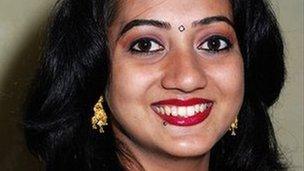Savita Halappanavar death: Husband has faith in inquest
- Published
Praveen Halappanavar: "We have faith in the inquest. We hope we will get answers"
The widower of a dentist who died in hospital in Ireland after suffering a miscarriage said he has faith in the inquest to establish the truth.
Savita Halappanavar, 31, was 17 weeks pregnant and miscarrying when she was admitted to University Hospital Galway on 21 October last year.
She later lost the baby and died from suspected septicaemia.
Her husband, Praveen, has said that several times over a three-day period they asked for a termination.
He said this was refused because there was still a foetal heartbeat.
He said that he was told: "This is a Catholic country."
Staff have denied that a Catholic ethos was responsible for the Indian dentist's treatment.
However, her death, a week after admission, put the spotlight on the Irish Republic's confused abortion laws.
Arriving for the first day of evidence, Mr Halappanavar said the last few days had been difficult as the couple's baby had been due on 30 March - the day he was handed a health service report into his wife's death.
"We have faith in the inquest, so hopefully we will get the answers," he said.
"The big question is why was Savita treated the way she was not supposed to be? We just want to know why she died."
The inquest at the courthouse in Galway city is scheduled to last at least a week.
Medics involved in treating Mrs Halappanavar will be called to give evidence along with experts including former master of the National Maternity Hospital Dr Peter Boylan.
Mr Halappanavar has insisted that an abortion was refused during the miscarriage and at one point the couple were told it was because Ireland "is a Catholic country".
The widower said: "All I want is to get to the bottom of it, to the truth, so (I'm) looking forward to it."
Mr Halappanavar said he could feel his late wife's presence.
"She has always been there and it always feels that she has been there and I get the strength from her," he said.
"It's going to be a very tough day. The last few days have been very rough."
He added: "I've been confident right from day one that we will get to the truth, I want the truth, so we will just have to wait and see."
'Shied away'

Savita Halappanavar's family said she asked several times for an abortion before she died
It is understood that some of the medical staff will argue the Republic of Ireland's confused and confusing laws contributed to what happened.
At the moment, after a 1992 Supreme Court ruling, a pregnant woman can get an abortion if her life, as distinct from her health, is at risk because of the continued pregnancy.
And the credible threat of suicide is constitutionally regarded as grounds for a termination.
But no enacting legislation was ever introduced to give doctors legal certainty as to when an abortion can be carried out.
Successive governments have shied away from bringing in such a law, but the current Fine Gael-Labour coalition has promised to do so and has indicated that it hopes to have the legislation passed by the Irish Parliament's (the Dail) summer break.
When the Dail eventually starts to debate the measure, which is expected to include the credible threat of suicide as a grounds for an abortion, there will be a lot of focus on the Fine Gael parliamentary party.
A number of its TDs have said they support the position of the Catholic Church and anti-abortion pressure groups who argue that legislating for the suicide threat could lead to abortion on demand, something the government strongly denies will happen.
- Published8 April 2013
- Published13 February 2013
- Published23 November 2012
- Published16 December 2010
- Published14 November 2012